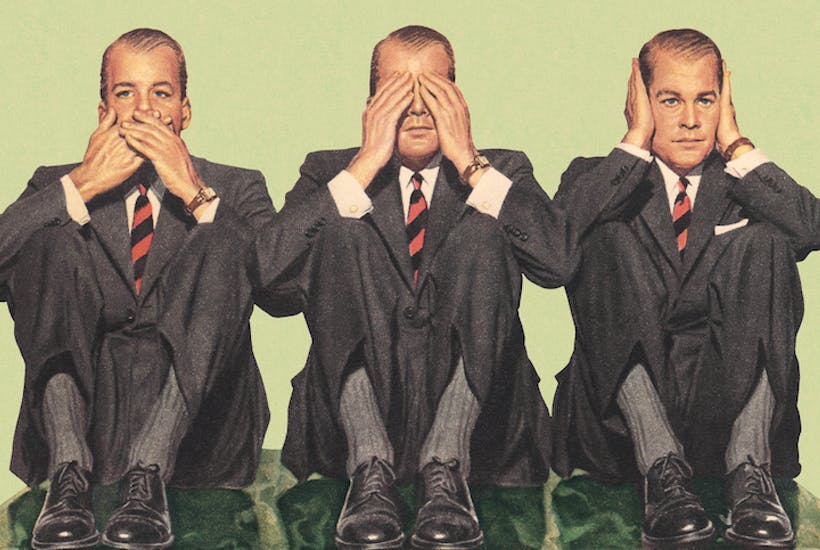At a party earlier this summer, I was chatting to a man who asked me how I voted in last year’s EU referendum. I don’t see why anybody asks that question more than a year on, and I don’t see why anyone should be expected to answer. There is no faster way to sour a perfectly fine evening. Whatever you say, you risk causing offence, so why bother? I told the man I preferred not to say, and that I still don’t really know what I think about Brexit. He appeared put out by my reluctance — as if I was the one being rude. Before long he made his excuses and moved on.
I find myself in that situation more and more in social encounters — skirting round questions in order to avoid an embarrassing argument only to find I’ve caused more awkwardness. It happens not just when I’m asked what I’ve done in the privacy of the polling booth. People increasingly seem to expect me to have firm convictions on almost every story in the news, then get upset not because I voice strong opinions, but precisely because I don’t.
The most startling instance came during a wedding recently. The starter was served, and the man to my left began to talk about American politics. He was utterly fixated on the Russians, and no doubt you can guess the rest. Didn’t I think it was terrible that all those Trump voters had been brainwashed by Vladimir Putin and his clever algorithms? I didn’t know, I said, but wasn’t this salmon delicious? By the time the main course arrived, he had gone, and taken his knife, fork and chair with him.
Perhaps it’s because I work at The Spectator that people assume I have lots of robust opinions. I suppose that’s understandable. But the truth is, I don’t. There are only a handful of subjects I feel completely comfortable having a position on. As for the rest, I am more than happy to admit I know little, and therefore feel it is pointless to pretend I care deeply. That confession is unlikely to encourage the editor to ask me for more column ideas — but bugger it, because if there’s one thing I do feel strongly about, it’s not being forced to have strong opinions. What I find tiresome is that it’s becoming less acceptable to duck out of a debate. Who hasn’t been to an event and had to listen to someone droning on and on about how to solve Syria’s crisis or why Islam isn’t actually ‘a religion of peace’. The person then turns to you and says: ‘What’s your take?’ Yes, I think, I read the same article as you. But why should I claim it’s my carefully thought-out position just so we can feel our views matter? They don’t really.
Besides, how can one be expected to have well-formulated opinions on everything? Israel-Palestine? Seems complicated. Young people voting for Jeremy Corbyn? Could be good, could be bad. Gender-fluidity? Um… The world is becoming more complicated and global issues ever thornier. It would require monk-like devotion to do all the reading required to give a properly formed judgement.
For each of these topics, there is usually an orthodox view and a heretical one. If you refuse to reveal your own thoughts, you leave yourself open to the accusation that you are keeping quiet precisely because you hold the heretical view. If you don’t explicitly say otherwise, how should anyone know that you don’t secretly think refugees deserve to drown with their families in rickety old boats bound for Italy, or that the poor should be burnt to death in aluminium-clad tinderboxes?
It’s the media’s fault, of course. Newspapers, TV and radio channels are always encouraging us to air our views in the name of democratic debate, to ‘join the conversation’. Opinion is like yeast: it keeps blooming. For cash-strapped news organisations, it can be a cheap way to cultivate what they like to call content. Without it, the 24-hour news cycle would starve.
Social media has an even greater appetite. Nobody wants to appear ignorant, or superficial, so we have become a nation of bores instead. Sites such as Twitter and Facebook have turned into platforms where you can make it quite clear to everybody that you are not a racist, a sexist or a homophobe. Or if you don’t care about being considered a bigot, you can always do the opposite and make a name as a raucous controversialist. This isn’t for the faint of heart. Reputations have been trashed in fewer than 140 characters and once you become known for your outlying views, it’s hard to retreat to more sensible ground. Often it’s best to say nothing.
I do like reading and listening to opinions. I wouldn’t work in journalism if I couldn’t stand it, and I certainly wouldn’t last long at The Spectator. Give me massive dollops of provocation and controversy. I even enjoy reading the most sincere and humourless newspaper columnists and social media essayists. If our society is genuinely civilised, there should always be space for them all. And when the moment comes when a commentator is proven right or wrong, it’s entertaining to admire their foresight or chuckle at their folly: those prophets who said Donald Trump would be the 45th President of the United States, for instance, or the fools who convinced us — and the Prime Minister — that she would get a stonking majority.
But with all this gassing on in the name of free speech, it is easy to forget that one of our most precious liberties is the right to say: ‘I’m sorry, I don’t know.’
Got something to add? Join the discussion and comment below.
Get 10 issues for just $10
Subscribe to The Spectator Australia today for the next 10 magazine issues, plus full online access, for just $10.
You might disagree with half of it, but you’ll enjoy reading all of it. Try your first month for free, then just $2 a week for the remainder of your first year.















Comments
Don't miss out
Join the conversation with other Spectator Australia readers. Subscribe to leave a comment.
SUBSCRIBEAlready a subscriber? Log in